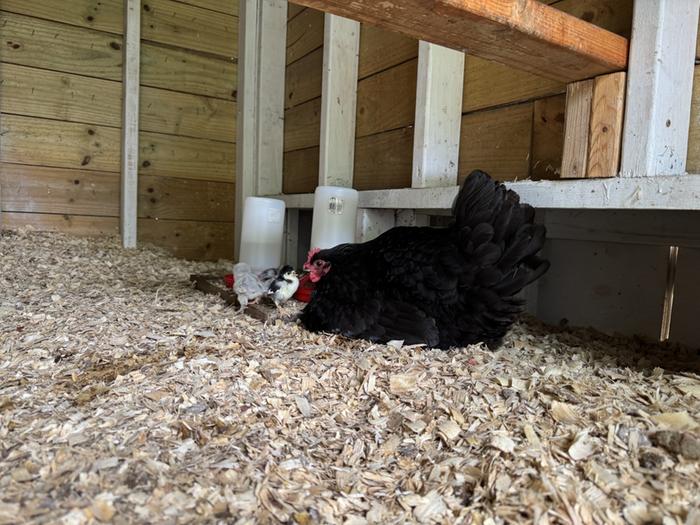

 1
1





- Tim's Homestead Journal - Purchase a copy of Building a Better World in Your Backyard - Purchase 6 Decks of Permaculture Cards -
- Purchase 12x Decks of Permaculture Cards - Purchase a copy of the SKIP Book - Purchase 12x copies of Building a Better World in your Backyard
 3
3




"When the whole world is running towards a cliff, he who is running in the opposite direction appears to have lost his mind." C.S. Lewis
Visit https://themaineingredient.com for organic, premium dried culinary herbs that are grown, processed, and packaged in the USA.
 2
2




 1
1




"When the whole world is running towards a cliff, he who is running in the opposite direction appears to have lost his mind." C.S. Lewis
Visit https://themaineingredient.com for organic, premium dried culinary herbs that are grown, processed, and packaged in the USA.
 5
5




Zone 9b
 3
3




Matt McSpadden wrote:When a hen is broody, they do not lay eggs, and they eat and drink a lot less. Because of this, I highly recommend either letting her sit on eggs, or do what you can to break the cycle. I don't think letting a hen stay broody without the fulfillment of hatching chicks is good for the chicken. Nor is it good to have laying chickens who are not laying. If the chickens are your pets... its a little different. But if you have chickens for laying eggs... and they are not laying eggs, then that can be a problem.












 3
3




- Tim's Homestead Journal - Purchase a copy of Building a Better World in Your Backyard - Purchase 6 Decks of Permaculture Cards -
- Purchase 12x Decks of Permaculture Cards - Purchase a copy of the SKIP Book - Purchase 12x copies of Building a Better World in your Backyard
 2
2




"When the whole world is running towards a cliff, he who is running in the opposite direction appears to have lost his mind." C.S. Lewis
Visit https://themaineingredient.com for organic, premium dried culinary herbs that are grown, processed, and packaged in the USA.
 2
2




Zone 9b
 2
2




Juniper Zen wrote:They’re not laying eggs and all they do is sit on the nest… how much energy are they expending? 🤔
"When the whole world is running towards a cliff, he who is running in the opposite direction appears to have lost his mind." C.S. Lewis
Visit https://themaineingredient.com for organic, premium dried culinary herbs that are grown, processed, and packaged in the USA.












 3
3





- Tim's Homestead Journal - Purchase a copy of Building a Better World in Your Backyard - Purchase 6 Decks of Permaculture Cards -
- Purchase 12x Decks of Permaculture Cards - Purchase a copy of the SKIP Book - Purchase 12x copies of Building a Better World in your Backyard
 3
3




Zone 9b












 2
2




- Tim's Homestead Journal - Purchase a copy of Building a Better World in Your Backyard - Purchase 6 Decks of Permaculture Cards -
- Purchase 12x Decks of Permaculture Cards - Purchase a copy of the SKIP Book - Purchase 12x copies of Building a Better World in your Backyard
 7
7




Juniper Zen wrote:I dunked my five (thought it was four, but actually five!) broody hens into a bucket of cold water, up to their shoulders, yesterday in the late afternoon and again this morning. This evening all five were back on the nesting boxes.
Zone 9b












 9
9






- Tim's Homestead Journal - Purchase a copy of Building a Better World in Your Backyard - Purchase 6 Decks of Permaculture Cards -
- Purchase 12x Decks of Permaculture Cards - Purchase a copy of the SKIP Book - Purchase 12x copies of Building a Better World in your Backyard

 3
3




Timothy Norton wrote:I had another hen go broody. This hen, an australorp, is absolutely refusing taking no for an answer.
I love my little life.

 Maybe it's something in the air, the deep, sweet content <3
Maybe it's something in the air, the deep, sweet content <3
* Follow your curiosity , Do what you Love *
Permaculture page on Simperi website | Buy my house :)
 11
11




Nina Surya wrote: And I thought australorps never get broody

Timothy Norton wrote:So who am I to stop her?
Visit Redhawk's soil series: https://permies.com/wiki/redhawk-soil
How permies.com works: https://permies.com/wiki/34193/permies-works-links-threads
 4
4




 8
8




 6
6




$10.00 is a donation. $1,000 is an investment, $1,000,000 is a purchase.

|
Honk if you love justice! And honk twice for tiny ads!
Learn Permaculture through a little hard work
https://wheaton-labs.com/bootcamp
|


